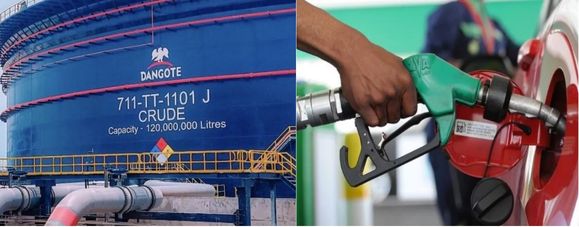BUSINESS

IMPORTERS ALLEGE DANGOTE PETROL N65 CHEAPER IN TOGO
Some fuel importers in Nigeria have alleged that the Dangote Refinery sells petrol to international traders at a rate N65 cheaper per litre than what it offers to local marketers.
The Depot and Petroleum Product Marketers Association of Nigeria (DAPPMAN) and the Petroleum Products Retail Outlet Owners Association of Nigeria (PETROAN) confirmed this in separate interviews.
DAPPMAN, in particular, criticised the refinery’s planned price reduction scheduled to take effect on Monday, describing it as an attempt to stifle competition. The refinery had announced that it would cut petrol prices from N865 per litre to N841 in Lagos and the South-West, and N851 in Abuja, Edo, and Kwara, while also commencing direct distribution of its products.
Speaking on the issue, DAPPMAN’s Executive Secretary, Olufemi Adewole, said members of the group had purchased Dangote’s petrol from international traders in Lome, Togo, at cheaper rates than those offered locally. He noted that although efforts had been made to buy directly from the refinery, the price was higher, making importation a more viable option in some cases.
Adewole further alleged that Dangote often reduces prices whenever fuel cargoes are brought into Nigeria by importers, thereby destabilising the market. “Dangote sells to international traders at N65 lower than what he offers to us. In some cases, we end up buying from those traders and still bringing the product into Nigeria,” he said.
He added that despite submitting DAPPMAN’s product requirements to the refinery twice, no allocations were made, and when offers came, they were tied to conditions unfavourable to marketers.
On whether importation is sometimes cheaper, he explained that while it is not always the case, there are instances where international traders offer better rates than Dangote.
Adewole insisted that the refinery must provide discounts to local marketers to offset freight and other costs, warning that people would continue importing fuel if prices abroad remained cheaper.
Supporting DAPPMAN’s claims, PETROAN’s National President, Billy Gillis-Harry, confirmed that Dangote’s fuel was indeed cheaper in Lome than in Nigeria. A major importer also disclosed that his company had refused to buy from the refinery due to poor profit margins.
In response, a spokesman for Dangote Refinery dismissed the allegations, suggesting that the marketers could be behind recent union attacks against the company. The Nigerian Union of Petroleum and Natural Gas Workers (NUPENG) had recently accused the refinery of anti-union practices and threatened industrial action.
Adewole, however, argued that the refinery’s price reductions were deliberately timed to coincide with the arrival of importers’ cargoes, creating price shocks that hurt competition and strained domestic businesses. He expressed concern that the refinery’s practice of offering lower prices to foreign buyers while keeping higher rates for local marketers contradicted its claims of prioritising Nigerians.
On the refinery’s clash with NUPENG, Adewole said the situation was worrisome, warning that it could affect the downstream sector and ordinary Nigerians if not resolved. He also stressed that Nigeria’s fuel stability should not be seen as dependent on a single refinery, noting that Dangote currently contributes only 30 to 35 per cent of national demand, with the rest supplied by other marketers under regulatory oversight.
Commenting on Dangote’s direct fuel distribution scheme, Adewole described the so-called “free delivery” arrangement as misleading. According to him, marketers are compelled to lift at least 25 per cent of their allocation directly from the refinery using Dangote-owned trucks at commercial rates, a system he said adds extra costs and limits flexibility.
While acknowledging the importance of the refinery, he maintained that it should not be regarded as a sole solution to Nigeria’s fuel supply challenges.
Meanwhile, Dangote Refinery has announced that it will begin deploying compressed natural gas-powered trucks on Monday as part of its distribution programme aimed at reducing logistics costs and lowering fuel prices nationwide. Under the new plan, gantry prices are expected to drop to N820 per litre, leading to corresponding pump price reductions in key states.
"This represents a significant development in our ongoing coverage of current events."— Editorial Board









